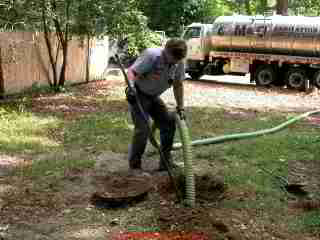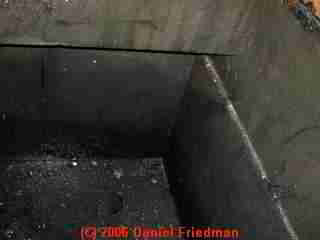 Septic System Inspection Checklist
Septic System Inspection Checklist
- POST a QUESTION or COMMENT about septic system inspection, tests, procedures, & checklists
Septic system inspection field data checklist & worksheets - part 2:
Here is the second of three detailed septic system field inspection and test worksheets to assist in inspecting and documenting the condition of septic systems.
This article is part of our series: Septic Systems Online Book procedures, defects in onsite waste disposal systems, septic tank problems, septic drainfield problems, checklists of system components and things to ask. Septic system maintenance and pumping schedules.
InspectAPedia tolerates no conflicts of interest. We have no relationship with advertisers, products, or services discussed at this website.
- Daniel Friedman, Publisher/Editor/Author - See WHO ARE WE?
SEPTIC INSPECTION WORK SHEETS - Septic System Inspection and Testing Worksheets
Here we provide the second of a series of field worksheets useful during the conduct of septic system inspections for investigations of the condition of a septic system using level 0, 1, and 2 septic inspections.
Additional Worksheet for Level 0 Inspection - Find, Pump Out, Clean, & Inspect the Condition of the Septic Tank
[Click to enlarge any image]
Watch out: Anyone inspecting septic systems MUST be familiar with the hazards and safety concerns discussed
at SEPTIC SYSTEM SAFETY WARNINGS Even falling into or deliberately entering an empty septic tank like the one shown here can be fatal as the worker is overcome by gases.
Septic tank pumping, which should not be performed until after any loading and dye testing, can provide additional key information about the condition of the septic tank and even, indirectly, the condition of the drainfields.
These photographs show a septic tank being pumped and then the interior of the concrete tank after septic tank cleanout.
TREATMENT TANK:
TANK LAST PUMPED: _________________ Information Source: Seller/Realtor/Other
Reason for Pumping: Regular Service, Inspection, Diagnosis, Other:_________
Components inspected when last pumped: Y/N Volume Pumped Out: _______
Damage/Defects Observed:________________________________________________
Site-built tank, not water tight; missing/damaged baffles; damaged cover;
tank settling, dislocating piping; bottom of scum within 3" of outlet bottom;
top of sludge within 8" of outlet baffle (need pumping).
COMMENTS:____________________________________________________________
WARNING: Tanks not pumped regularly are at extra risk of hidden, potentially
costly damage to the Absorption system. Tanks pumped immediately prior to the
inspection may prevent normal system testing (by loading with water) and may
indicate a history of recent problems or failures.
OVERLOADED SYSTEMS: If the system is overloaded or you see sludge at or over
the exit baffles, do not recommend immediate pumping until the root
cause of the problem has been determined and corrected. Otherwise an
objective second opinion may not be possible.
PUMPING EQUIPMENT: (Locate on site plan)
PUMP-Mound Not Visible. Reported/observed at:________________
Operating Satisfactorily Y/N Information Source: Seller/Realtor/Other
Single Pump/Duplex Pump Pump Alarm System Installed Y/N
Electrical Wiring: Not Visible Exposed/Unsafe/Needs Repairs
Depth of flooding in pump tank from bottom of lid to water surface _____in.
Depth of sludge in pump tank _________ in. Tank Pumped Y/N Date_________
Pump cycle/drawdown time: _____________ minutes
Alarm installed Y/N Tested Y/N Working Y/N Separate Circuit Y/N
Pump Chamber Capacity Not visible Capacity________________________
PUMP-Ejector Not Visible. Reported/observed at:________________
Operating Satisfactorily Y/N Information Source: Seller/Realtor/Other
Electrical Wiring: Not Visible Exposed/Unsafe/Needs Repairs
Pump cycle/drawdown time: _____________ minutes
Sludge in pump tank Y/N
COMMENTS:____________________________________________________________
WARNING: pump systems require a special sewage pump; use of sump pumps
or other improper pumps will result in short, unreliable system operation.
DISTRIBUTION BOX LOCATION:
Not Identified. Reported/observed at:________________
Information Source: Seller/Realtor/Other
Damage/Defects Observed: Solids from tank, leaks, out of level, clogs___
DOSING TANK with pumps or siphons:
Not Identified. Reported/observed at:________________
Information Source: Seller/Realtor/Other
Damage/Defects Observed: Solids from tank, leaks, pump defects, ________
ABSORPTION SYSTEM: (Locate on Site Plan if possible)
None Present: Comments:____________________________________________________
Elevated Sand Mound Absorption Area:___________________________
Seepage Bed Absorption Area:___________________________
Trench System Absorption Area:___________________________
Cesspool Capacity:_____________________________ Used for Overflow Y/N
Other:_______ Absorption Area:___________________________
Leaching Pits/Chambers/Galleries: Number:__________________________________
Leach Trenches: Number:_____ Length:________________ Separation:___________
Leach Fields: Number:_____ Dimensions:____________
Design Defects: trench/piping at excessive slope (>25%); surface water
flooding; flood-prone area; rocky soils;
less than 10ft from property line;
less than 100ft from well;
less than 50ft from pond/stream;
Damage/Defects Observed: Solids from tank, hydraulic failure, ponding,
(Most effluent, dye, odors; surface defects: grading, settlement,
systems) slope failure, erosion, ruts from vehicles; inspection ports
show uneven effluent levels in individual trench/bed;
encroachments onto area by drives, buildings, pools, etc.
exposed to runoff, roof drainage, water softener, etc.
vegetation, trees, ponding, other signs of failure
Damage/Defects Observed: hydraulic failure, cover damage, inlet pipe
(Cesspool) damage, ground subsidence, structural collapse, plus others
listed above
ADDITIONAL VISUAL INSPECTION of the ONSITE SEPTIC SYSTEM or WASTEWATER DISPOSAL System
TANK COVER OPENED Y/N DAMAGED Y/N SECURE Y/N (Safety Concern)
BAFFLES VISIBLE Y/N DAMAGED Y/N
SLUDGE EXITING TANK Y/N (Indicates serious damage to absorption system)
COMMENTS:____________________________________________________________
WARNING: Damaged tank baffles is a strong indication of serious, potentially
costly damage to the Absorption system. Additional inspection and possibly
excavation will be necessary to evaluate this system.
CESSPOOL ONSITE INSPECTION SPECIFICS: (Locate on Site Plan)
Number and configuration:______________________________________________
Dimensions: ___________________________________________________________
Depth, top of liquid to inlet invert:_______________
Depth, solids layer: _______________________________
Depth, scum layer: _______________________________
Materials/Construction:________________________________________________
Damage/Defects Observed: groundwater inflow, __________________________
...
Continue reading at LEVEL 1 SEPTIC INSPECTION WORK SHEET or select a topic from the closely-related articles below, or see the complete ARTICLE INDEX.
Or see these
Recommended Articles
- SEPTIC SYSTEM INSPECTION LEVELS
- SEPTIC FAILURE SIGNS
- SEPTIC SYSTEM INSPECTION & TEST GUIDE - home
- SEPTIC DRAINFIELD INSPECTION & TEST - home
- SEPTIC SYSTEM INSPECTION WORK SHEETS - 3 Septic inspection checklists & data recording sheets help define 3 levels of thoroughness of septic tank and field inspection & testing
- LEVEL 0 SEPTIC INSPECTION WORK SHEET Septic inspection checklist for Level-0 basic septic system inspections
- L-0 SEPTIC INSPECTION ADDITIONAL WORK SHEET Supplemental septic inspection checklist for Level-0 testing
- LEVEL 1 SEPTIC INSPECTION WORK SHEET Septic inspection checklist for Level-1 septic system inspection
- SEPTIC LOADING & DYE TEST PROCEDURE - home
- SEPTIC SYSTEM SAFETY WARNINGS
- SEPTIC TANK GRASS or SNOWMELT - clues indicating septic system failure
- SEPTIC TANK INSPECTION PROCEDURE - home
Suggested citation for this web page
L-0 SEPTIC INSPECTION ADDITIONAL WORK SHEET at InspectApedia.com - online encyclopedia of building & environmental inspection, testing, diagnosis, repair, & problem prevention advice.
Or see this
INDEX to RELATED ARTICLES: ARTICLE INDEX to SEPTIC SYSTEMS
Or use the SEARCH BOX found below to Ask a Question or Search InspectApedia
Ask a Question or Search InspectApedia
Try the search box just below, or if you prefer, post a question or comment in the Comments box below and we will respond promptly.
Search the InspectApedia website
Note: appearance of your Comment below may be delayed: if your comment contains an image, photograph, web link, or text that looks to the software as if it might be a web link, your posting will appear after it has been approved by a moderator. Apologies for the delay.
Only one image can be added per comment but you can post as many comments, and therefore images, as you like.
You will not receive a notification when a response to your question has been posted.
Please bookmark this page to make it easy for you to check back for our response.
IF above you see "Comment Form is loading comments..." then COMMENT BOX - countable.ca / bawkbox.com IS NOT WORKING.
In any case you are welcome to send an email directly to us at InspectApedia.com at editor@inspectApedia.com
We'll reply to you directly. Please help us help you by noting, in your email, the URL of the InspectApedia page where you wanted to comment.
Citations & References
In addition to any citations in the article above, a full list is available on request.
- Our recommended books about building & mechanical systems design, inspection, problem diagnosis, and repair, and about indoor environment and IAQ testing, diagnosis, and cleanup are at the InspectAPedia Bookstore. Also see our Book Reviews - InspectAPedia.
- In addition to citations & references found in this article, see the research citations given at the end of the related articles found at our suggested
CONTINUE READING or RECOMMENDED ARTICLES.
- Carson, Dunlop & Associates Ltd., 120 Carlton Street Suite 407, Toronto ON M5A 4K2. Tel: (416) 964-9415 1-800-268-7070 Email: info@carsondunlop.com. Alan Carson is a past president of ASHI, the American Society of Home Inspectors.
Thanks to Alan Carson and Bob Dunlop, for permission for InspectAPedia to use text excerpts from The HOME REFERENCE BOOK - the Encyclopedia of Homes and to use illustrations from The ILLUSTRATED HOME .
Carson Dunlop Associates provides extensive home inspection education and report writing material. In gratitude we provide links to tsome Carson Dunlop Associates products and services.


